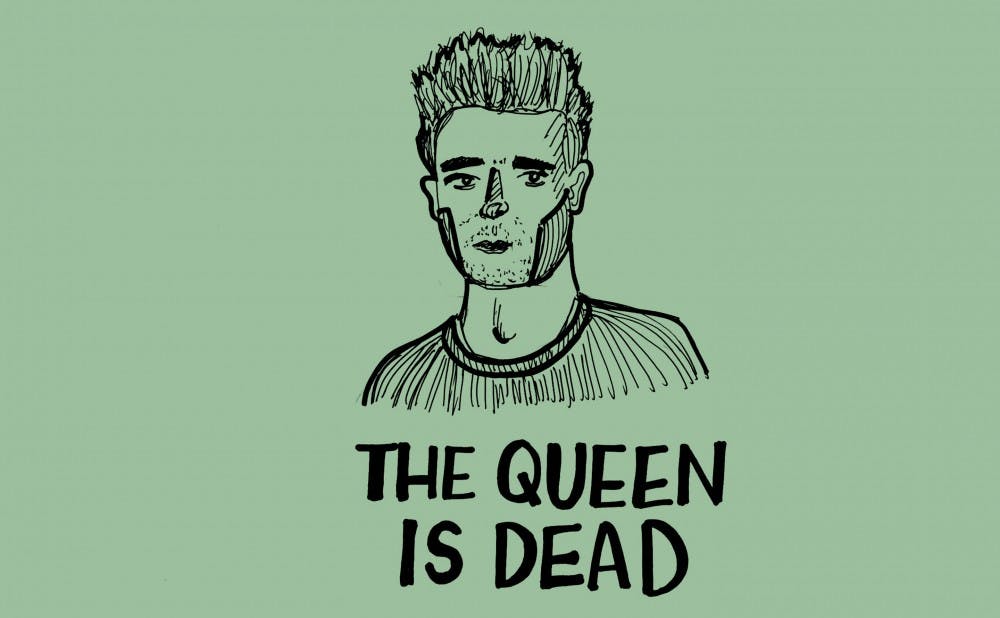I clearly remember the crisp fall days of my first year of high school, waiting on the corner of my street for the bright yellow school bus to rattle up to my stop. I recall staring forlornly out of the window, watching the water droplets pool together as Morrissey’s haunting croon drifted through my headphones for the first time in a moment of striking euphoria. Since then, The Smiths’ acclaimed and quintessential “The Queen is Dead” has been a staple in my musical repertoire.
The Smiths’ third and suitably named studio album underlines a group at the pinnacle of its career. Its discovery defined my musical tastes and marked a period of my own existential fascination. I stumbled upon The Smiths not of my own accord but as I read Rainbow Rowell’s “Eleanor and Park,” a story about an odd pair who enjoy listening to odd music together. Never has an album made me feel so dreadfully jovial, experienced such wretched bliss, as “The Queen is Dead,” and nothing truly has since I was first engulfed by the surging chorus of “There Is a Light That Never Goes Out.”
Despite the laughable absurdity of dying at the mercy of a double-decker bus, the yearning sincerity of “the pleasure, the privilege is mine” intensifies their trademark despondent charm. “The Queen is Dead” does not shy away from a deft exploration of mortality with an approach that is anything but burdensome.
Exemplifying their antithetical idiosyncrasy (with an unexpected tongue-lashing to plagiarists), “Cemetry Gates” paints a less-than-cheerful backdrop with jaunty acoustic guitar and vocals. A standout track, the deceptively bright harmony, clashing with Morrissey’s evident distaste for sunny days, offers an optimistic perception of mortality. Although the uncertainty and unfamiliarity of death brings him to tears, Morrissey proclaims the “weird lover” Oscar Wilde on his side, identifying with his sanguine outlook on the hereafter.
The biting and bitterly ironic “Bigmouth Strikes Again” has always been my personal favorite track. Subjecting an endearing “sweetness” to bludgeoning would cast a dark mood upon any song, yet as The Smiths tend to do, the sickening sadism is met with amusement and intrigue. An attack on the merciless media, “Bigmouth Strikes Again” elevates Morrissey to martyrdom, comparing himself to the heroine Joan of Arc.
Similarly, “The Boy With the Thorn in His Side” betrays religious undertones at the frustration of naysayers: “How can they hear me say those words / Still they don't believe me?” By the time the album closes with “Some Girls Are Bigger Than Others,” I am ready to let out a much-needed sigh of relief.
Perhaps the most interesting aspect of The Smiths’ career was their timing. Despite curating their own distinctive sound, The Smiths fought a perpetual battle with their old-school British predecessors at the “Top of the Pops.” “The Queen is Dead” peaked at No. 2 on the UK albums chart, yet The Smiths struggled to keep their singles high-ranking for long, compared to the likes of The Beatles or The Who in the heyday of the British Invasion.
Their alienation from the mainstream pop of the ’80s allowed The Smiths to reinstate the currency and urgency of the punk and anarchist movements in the ’70s. For me, The Smiths define the ’80s New Wave genre — an anachronism in light of the machismo of hair metal and cheesiness of synth-pop. The title track, “The Queen is Dead,” is a subtle jab at the monarchy — somewhat similar to that of The Sex Pistols’ “God Save the Queen,” but lacking in the brazen aggression of the latter. What has always impressed me about Morrissey is his possession of a certain adroitness and poetic sensibility. He plays with irony and double-entendre and couples levity with lamentation in such a way that invokes a wry smile that can’t help but suggest “I see what you did there.”
As unlikely a pairing as “selling out” and political dissent seems to be, Morrissey never renounced his desire for fame. In fact, on the lighthearted “Frankly Mr. Shankly,” Morrissey craves eminence, to “go down in celluloid history” with a veritable preference for fame over righteousness. Sure, The Smiths “sold out” in the end, but their mainstream success certainly does not discount their impact, despite how utterly unbearable Morrissey and his ego can often be.
Critics like to note that the skill of guitarist Johnny Marr kept the Smiths afloat, that bassist Andy Rourke and drummer Mike Joyce were the rhythmic foundation upon which Morrissey’s incomprehensible yodeling lay. But I attest that without Morrissey’s dreamy drone, his carefree flamboyance and his all-around subversive style of dancing, The Smiths unquestionably would not be, well, The Smiths.
But the sheer relatability of The Smiths, more than any historical context, is ultimately what has made the band's lasting impact since it dismantled. The Smiths have eternalized Morrissey as a forsaken figure in exile, and the loneliness he confides I find reflected in myself at times. His wistful cries of an aching longing and not belonging resonate with those who feel cast aside. I may have worn out “The Queen is Dead” long ago, but it is an album I can always revisit without risk of it becoming stale. Whenever I play “The Queen is Dead,” I am transported to those solitary fall days, of feeling naive and unhappy and yet altogether content.
Get The Chronicle straight to your inbox
Sign up for our weekly newsletter. Cancel at any time.

